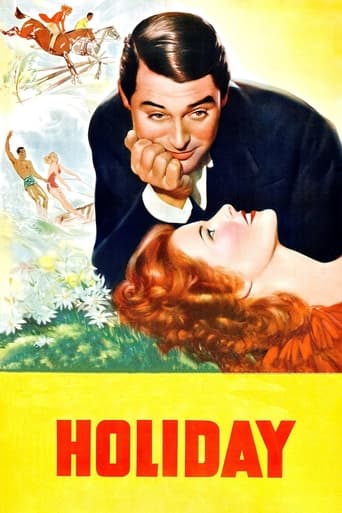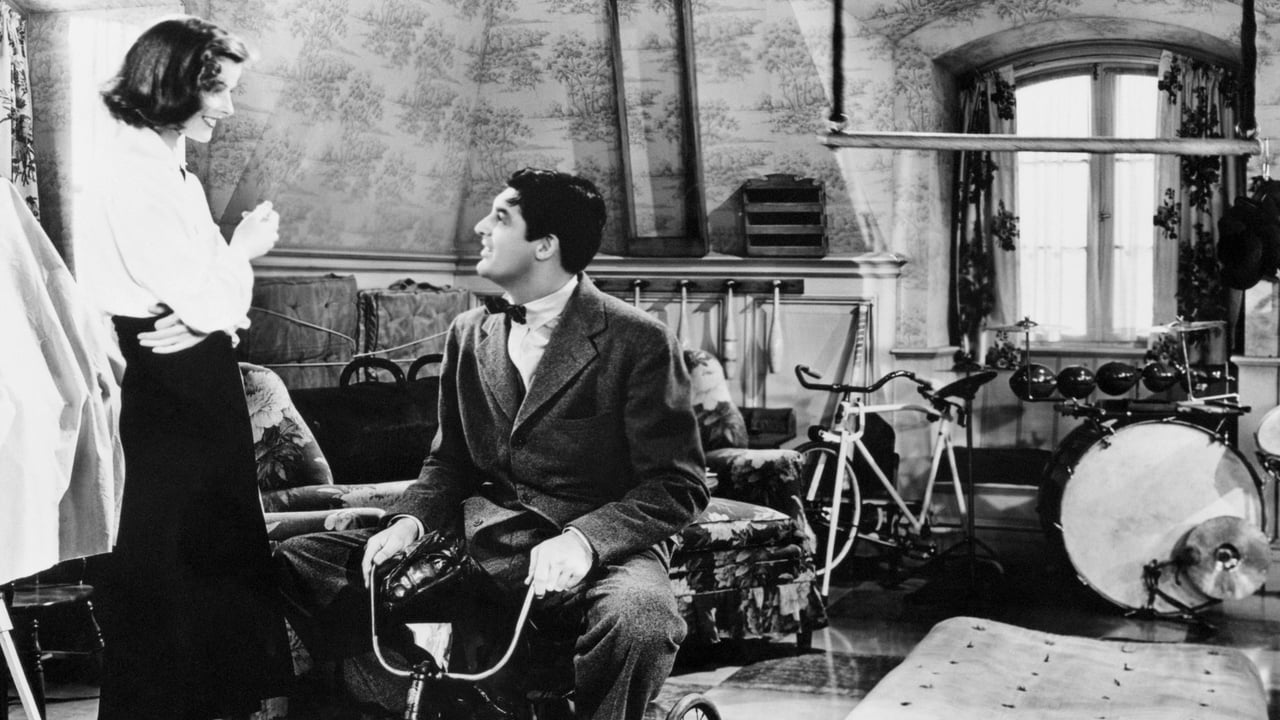lugonian
HOLIDAY (Columbia, 1938), directed by George Cukor, from the 1928 stage play by Philip Barry, is an updated comedy with serious overtones that marked the third screen collaboration of Katharine Hepburn and Cary Grant. While there are those who'd rather ignore their initial pairing of SYLVIA SCARLETT (RKO, 1935), in favor of the fast-paced/ madcap comedy of BRINGING UP BABY (1938), HOLIDAY, which immediately followed, offers both sophistication and originality, in spite the fact that the story had been filmed eight years earlier (Pathe, 1930)starring Ann Harding (Linda), Mary Astor (Julia), Robert Ames (John) and Monroe Owsley (Ned). The advantage both films have is the delightful presence of character actor Edward Everett Horton playing Nick Potter in both versions. For this edition, HOLIDAY, both Hepburn and Grant are at their finest.Set in New York City during both the Christmas and New Year's holidays, the narrative opens with 30-year-old Johnny Case (Cary Grant), returning from his skiing vacation in Lake Placid by taxi. He first stops over the apartment of his very best friends, Nick (Edward Everett Horton), a college professor, and his wife, Susan (Jean Dixon), with the news that he's met and now engaged to a girl he's met during his holiday, and will be married in ten days. This is followed by his visit to the home of his fiancé, Julia Seton (Doris Nolan) where he's to meet and acquaint himself with her family. To his surprise, Johnny finds Susan a debutante living in a Park Avenue mansion with stairways and elevators big enough to pass as a museum. During the course of the story, Johnny is introduced to Julia's brother, Ned (Lew Ayres), an unhappy individual who drowns his sorrows with alcoholic drinks; her sister, Linda (Katharine Hepburn), a carefree heiress who takes an immediate like towards the equally carefree Johnny; and her father, Edward Seton (Henry Kolker), a serious-minded banker whose business comes ahead if his family. He is both stunned and appalled after being told by Susan during his attendance in church of her engagement, and now intends to learn more about this young man. Linda, a "black sheep" of the family with sentimental memories of her late mother, yearns the love and affection from her father. She finds comfort in the family playroom on the fourth floor that was formerly her mother's place for escape. After the New Year's Eve engagement party for which Linda chooses not to attend, the Seton family is appalled to learn that Johnny, having worked since he was ten, has his own philosophy to enjoy life first by retiring young and going back to work after comprehending the reason for working in the first place. While Linda sides with his right to be free and happy while still young to enjoy life, both Julia and her father have other means of persuading Johnny to think as they do. Also appearing in the cast are Henry Daniell (Seton Cram, Julia's cousin); Binnie Barnes (Laura Cram, Seton's wife) Bess Flowers, Matt McHugh and Neil Fitzgerald, among others. The direction of George Cukor translates Donald Ogden Stewart's screenplay into a well produced production. Not a laugh-out-loud comedy, but a pleasant 93 minutes. Of those in the Seton family, Lew Ayres, shortly before achieving success in the "Doctor Kildare" film series (1938-1942) for MGM, wins both sympathy and honors for his realistic approach of a unhappy single man unable to fulfill his life's ambition as both drummer and composer of the "Seton Concert," now tied down to his strict father's idea of family tradition in the business world. Hepburn's Linda, the stronger of the siblings, a misunderstood member of the family, would rather lose her father's love than her the self-respect lost to her brother, Ned. Doris Nolan, who at times resembles Joan Fontaine through her profile and Fontaine hairstyle of the day, best described as "sweet and intelligent" who, in actuality, to be more like her father than her free-spirited sister. Amusing highlights include Grant's backward flip-flops to express happiness, Horton and Dixon's mini puppet show, and Hepburn's expertise in handling her character to resemble that of her personal self. She and Grant make a grand team, and it shows how much they commend each other with their scenes. Hepburn and Grant would team one more time in another screen adaptation of Philip Barry's based play to THE PHILADELPHIA STORY (MGM, 1940), shortly before Kate would win immortality with her much better known screen partner of Spencer Tracy in nine feature films during the course of 25 years.Due to the fact that HOLIDAY was formerly broadcast on commercial television often during the Christmas season, for some reason it's seldom listed as a "holiday" movie, hence the title. Aside from early distribution onto video cassette in the 1980s, and decades later on DVD, cable television broadcasts have varied, but commonly found on Turner Classic Movies where it been airing since its humble beginnings dating back to 1994. (****)
Dalbert Pringle
Everything that "The Philadelphia Story" was, "Holiday" wasn't.If the point of Holiday's story was to convince me that the incredibly rich were just a bunch of boring, stuffy, petty, snivelling, tantrum-throwing, one-dimensional goofs (Yeah. That about covers it), then, yes, it certainly achieved its intended goal quite successfully.Holiday is a prefect example of why I generally detest and often avoid watching "Screwball" comedies from the 1930s and 40s.Its story was so contrived, predictable and riddled with every "poor-little-rich-girl" cliché in the book that it made my skin absolutely crawl in complete revulsion to everything that it supposedly stood for.One aspect of Holiday's "far-from-believable" story that really killed me had to do with the 3 spoiled-brat children (who were all around the age of 30) of wealthy banker, Edward Seton.These 3 big sucks clearly resented "daddy-dearest" for the dominating and (apparent) strangle-hold that he had on their lives. Yet these 3 little whining cry-babies continued to live under the same roof with this overbearing, money-grubbing, Wall Street monster. And that, to me, rendered them all a bunch of selfish, temperamental, hypocritical wimps as they greedily guzzled down his booze and paraded around in all of their tres' chic, designer outfits.Holiday was the sort of film whose story really sent out a very confused and mixed message about the super-wealthy set. It just couldn't decide whether it wanted the viewer to laugh at them, or to hate them, or to enviously desire to be just like them. But, whatever - This film's story was "Screwball" comedy at its absolute most detestable, in my opinion.And, besides all of that nonsense, I definitely thought that the chemistry between its 2 big-name stars, Katharine Hepburn and Cary Grant, stank, big-time. And that's because there really was no chemistry between these 2, whatsoever.Of the 4 principal characters who dominated Holiday's story, it was Cary Grant's "I-just-wanna-bum-around-for-the-rest-of-my-life" role as John Case who rang the most false and pretentious.Immaculately groomed in his tailor-made suites and shiny shoes, I wasn't convinced, for even a minute, that this "good egg" wasn't even phased one bit by the possibilities available to him through all of Seton's financial wealth. To me, Case's phony, non-materialistic philosophy didn't hide the fact that beneath his apparent selfless intentions lurked a greedy, little gold-digger just waiting to pounce on all that dough.
AaronCapenBanner
Cary Grant plays Johnny Case, a free-thinking man who is engaged to Linda Seton(played by Katharine Hepburn) who is a daughter of a millionaire, who wants Johnny to settle down and join his business, which he is reluctant to do, preferring instead to take a "holiday" for a few years while he is young, and able to enjoy it! This baffles his would-be father-in-law, though Linda and her brother Ned are sympathetic, as are Nick & Susan Potter, two old friends of his. What will Johnny do? OK comedy is amiable and breezy, if talky. Amusing to an extent, but awfully frivolous too. Works because of the good acting, especially Cary Grant, who is at least sympathetic here.
vincentlynch-moonoi
I thought I was a retired middle school principal, but apparently I'm wrong. I must be a comedian. I say that because people describe this as a comedy because it has some humor in it. I tell an occasional joke, hence I must be a comedian.This is a comedy? Let's see. You have the leading man in love with two women -- sisters. One sister is depressed about her life, but is brought alive when she meets her sister's finance. The other sister is in love with the leading man, but wants him to conform to her father's staid view of what life in high places should be. The father is a relic from New York City's elite, which is becoming passé since the Great Depression; meanwhile he stifles both (but particularly one) daughters to the point that one is in a state of depression. The brother is an alcoholic. The romantic lead has to decide whether to let one sister and the father ruin his dreams for his life, or marry the depressed sister who understands his dreams. So much for this being a comedy.That's not to say there's not humor here. Cary Grant repeatedly doing acrobatic tricks (he had formerly been an acrobat), and Katherine Hepburn joining him. A genuinely funny performance by Edward Everett Horton and his movie wife -- Jean Dixon.Perhaps the reason that this did not succeed at the box office was that Columbia pegged it as a comedy, but that's not what audiences found after they paid for their tickets. Perhaps critics, who generally praised the film, released what the film really was. I, too, give this film high marks for standing above many films of the time. The characters come alive far more than they did in many other films of the general time period. Grant, Hepburn, Horton and Dixon are superb, and at the very least, the rest of the actors do their jobs.There are many Cary Grant comedies. If that's what you want, go elsewhere. But if you want to see several outstanding performances in roles that are rather compelling...yet with a charming mix of humor mixed in here and there, this is the film for you.



 AD
AD








